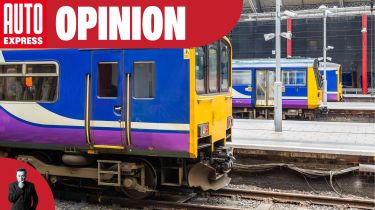The car reigns supreme and UK public transport strikes prove it
Mike Rutherford thinks the car is still the best way at avoiding public transport strike action

The first week of September pretty much had it all: transport chaos and unintended comedy, state-sponsored rip-offs, a bargain in the showrooms plus major product births (new Audi TT), deaths (Porsche Boxster and Cayman) and marriages (RoboBallet AI helping car-building robots work more harmoniously).
Also, there was further proof that the much-hyped ‘alternative to the car’ is as unreliable as ever. This thanks to some (not all) bus and train ‘workers’ being unable to shake off a seemingly incurable addiction to their drug of choice – industrial action.
A perfect example of the most recent misery, money-wasting and mayhem caused by such strikers was at Wembley Stadium. Almost 200,000 people bought tickets for major concerts at the venue on 7 and 8 September. But because these (and other) dates became train strike days that would sabotage the tube network, countless kids and adults would have been unable to get to the gigs. So organisers had to shift the dates. Multiply this example many, many times over and you’ll get some idea of the scale of the public-transport-strike disease that negatively impacts millions of people.
On a lighter note, the BBC that lately I’ve fallen out of love with played a blinder on 7 September with a lunchtime ‘news’ piece about – wait for it – Bus Aunty, who “loves making videos of red buses” and, er, that’s it! Never mind that The Beeb didn’t spot the irony of broadcasting the ‘story’ on a day when strikes disrupted over 60 bus routes where Aunty lives and films. The following day the BBC’s lead story was the appointment of a new Green Party leader erroneously announced as an “ego populist.” Priceless!
Government showed total contempt for motorists by greedily and senselessly imposing inflation-busting 40 per cent toll hikes at the Dartford Crossing, despite the fact that we – via tolls and other motoring taxes – have already paid for Dartford’s tunnels and bridge decades ago. C’mon AA and RAC, it’s time you used your corporate wealth and lawyers to lodge a legal challenge against this and other blatant motoring injustices.
Big surprises: from nowhere, Omoda of China is now outselling Fiat, Jeep, Polestar and plenty of other established marques. Strong London sales meant sister brand’s Jaecoo 7 was the sixth best-selling car in August, but less shocking was the revelation that Ford’s Puma is still No.1. And currently, the pure-electric Gen-E model is a steal for buyers who shop around. The best deal I found, on 4 Sept, required a £1,560 downpayment, then 23 monthly payments of just under £130. So total leasing costs of £4,550 over two years.
Deal of the day? More like the new-car bargain of 2025, I reckon. Why put yourself at the mercy of striking train and bus ‘workers’ when the all-in leasing price for a brand-new, high-quality compact EV can be little more than £2,000 a year?
If you're looking to buy a new Ford Puma Gen-E, or any car for that matter, check out the Auto Express Buy a Car service where you can find some great deals on brand-new and used cars...



